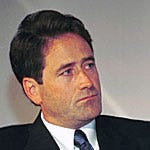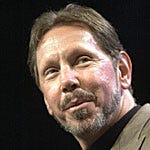Buyers' Market
Seismic shifts are in store for the enterprise apps industry. Are you ready?

When Manpower Inc. CIO Richard Davidson heard about PeopleSoft's bid early last week to acquire J.D. Edwards & Co. for $1.7 billion, potentially creating the world's second-largest enterprise applications vendor behind SAP AG, he said, "Now Oracle has to do something." Oracle did, bidding $5.1 billion for PeopleSoft Inc.
The enterprise applications landscape could end up looking markedly different than it did a week ago, as the industry's consolidation shifts into high gear. Combined, PeopleSoft and J.D. Edwards would have approximately $2.8 billion in annual revenue, 13,000 employees, and more than 11,000 customers. If Oracle succeeds in its takeover, it will have about 25% of the enterprise apps market, second to SAP's 54%--and J.D. Edwards may become a target for other vendors with aspirations in the enterprise applications space. Oracle said that it wants to complete the PeopleSoft deal first, then decide whether to go forward with the J.D. Edwards acquisition.
|
|
| |
|
Oracle CEO Larry Ellison, who said that PeopleSoft CEO Craig Conway approached him a year ago to discuss a possible merger of their companies, told analysts during a conference call last week that he's offering PeopleSoft shareholders a "much safer road" than the alternative: an independent PeopleSoft, whose revenue is already under pressure, branching out to compete more directly with Oracle and SAP, and increasingly against Microsoft, which has been steadily growing in the market through its own acquisitions. For its part, PeopleSoft says it approached Oracle last year about buying Oracle's applications business.
There was another high-profile acquisition last week. Once high-flying Baan Co. was picked up for $135 million by an investment group consisting of Cerberus Capital Management LP and General Atlantic Partners LLC. They will merge Baan with SSA Global Technologies, another enterprise resource planning vendor they own. With nearly $600 million in revenue and almost 16,000 customers, the combined entity will be one of the largest ERP vendors in the manufacturing sector.
Why all the consolidation activity? A depressed economy has made IT executives tight-fisted and less inclined to buy loads of new enterprise software. "The license revenue has just gone down for everybody, and for a lot of players it's been difficult just to keep their heads above water," says Bryan Funkhouser, a partner at consulting firm Deloitte & Touche. The quickest route to new customers--and more revenue--is through acquisition.
|
|
| |
|
In a statement, PeopleSoft's Conway called the takeover play "atrociously bad behavior from a company with a history of atrociously bad behavior." Executive VP and CFO Kevin Parker says it's "clearly a defensive strategy born out of the PeopleSoft and J.D. Edwards merger." Oracle's offer of $16 per share--just a 5.9% premium over PeopleSoft's closing price on June 5--makes it unlikely that shareholders will accept the deal, says Yankee Group senior analyst Mike Dominy. Oracle's low-ball offer highlights the low-growth prospects in the application market, according to an E-mail brief issued by UBS Warburg analyst Heather Bellini.
It will likely be weeks before the Oracle bid is resolved. If Oracle fails, PeopleSoft will gain 6,500 customers with its buy of J.D. Edwards and "an opportunity to [take] product advantages from each company and propagate them in each company's traditional markets," Conway says.
Photo of Craig Conway by Andrew Serban/Bloomberg News/Lando
Photo of Larry Ellison by Noah Berger/Bloomberg News/Landov PeopleSoft has good reasons to merge with J.D. Edwards. PeopleSoft is entrenched in the services industries but has had trouble competing in manufacturing, where J.D. Edwards excels. J.D. Edwards also is strong in the midmarket and Europe, where PeopleSoft has been trying to build a presence. Conway foresees serving up J.D. Edwards' manufacturing and distribution capabilities to PeopleSoft's customers and porting its human-capital management expertise to J.D. Edwards' OneWorld architecture for midsize businesses. J.D. Edwards chairman, president, and CEO Bob Dutkowsky says his customers have been asking for supply-chain enhancements in sourcing and E-procurement, which PeopleSoft has. "The result is customers wind up with stronger products on more hardware and operating systems and databases and Web servers than any other software company has," Conway says.
HDR Inc., an architectural- and engineering-services company, uses PeopleSoft's Enterprise Service Automation technology. CIO Angelo Privetera says the software has superior time-sheet management and human-resources capabilities, but J.D. Edwards is better at project-management. Privetera was looking forward to the vendors combining their product strengths.
He's bullish on consolidation in general. "There are too many players trying to do almost the same thing," Privetera says. In an InformationWeek Research survey of 259 business-technology professionals, almost half consider the growing consolidation in the software industry to be a good thing; 31% take a negative view.
But Privetera and other PeopleSoft customers could now face the darker side of consolidation: an end to their own products' lifelines. Ellison said Oracle would offer enhanced support for PeopleSoft products and incorporate advanced features of the software into its e-Business Suite, but it wouldn't actively sell the software to new clients. Oracle said it would provide automation tools to smooth migration to its software, but moving to a new ERP platform is typically costly.
Indeed, acquisitions create a host of challenges. The flip side of customers waking up to find their software no longer supported or upgraded is that vendors risk getting stretched thin supporting multiple products and platforms. When companies merge, they spend more time on internal politics than they do on the market and customers, says a CIO at a major chemical manufacturer who uses J.D. Edwards and PeopleSoft apps.
Some observers say innovation and interoperability suffer when vendors take a buy-versus-build approach. "The promise of cutting-edge functionality and completely integrated code to make transactions and processes smooth seems to be at odds with buying ad hoc," says John Fontana, a principal with Tigris Consulting, a supply-chain consulting and services firm.
An organic growth philosophy is a strong selling point for some customers. That's why Eric Parrott, senior manager of business systems at Tilia Inc., which makes a vacuum packaging system for food, says he's sticking with SAP for his ERP and customer-relationship management needs. "They're providing our business a full suite of products that are SAP-branded," he says.
But even SAP--which says it has no grand acquisition plans on the scale of Oracle or PeopleSoft--is looking to acquire small companies doing "innovative little things," said Dennis Moore, senior VP of cross applications for SAP Labs, at an industry conference last week. The combined SSA GT and Baan will have its eye on acquiring companies with expertise in manufacturing, says Baan president Laurens van der Tang. A possible target is Manugistics Group Inc., which had General Atlantic Partners as one of its original investors.
And if PeopleSoft's purchase of J.D. Edwards is blocked by Oracle, it's not inconceivable that Microsoft would take advantage of the situation. Acquisition of J.D. Edwards would give Microsoft access to several thousand IBM iSeries and AS/400 users whom it could migrate to its own infrastructure, says the Yankee Group's Dominy. Microsoft execs were not available for comment.
When major acquisitions are announced, it's the uncertainty that puts many IT execs on edge. Staffing-services provider Manpower this month started implementing J.D. Edwards apps in the United States and Canada, but it was holding off deploying in other countries pending "a strong commitment from PeopleSoft that they'll continue to support [them]," Davidson says. Analysts expect that at its user conference this week J.D. Edwards will debut incremental improvements to its supply-chain and CRM apps.
Mark Federle, CIO at Weitz Co., a building contractor that uses J.D. Edwards AS/400 apps, is generally positive about a PeopleSoft merger. But if J.D. Edwards turns out to be a "less-than-contributing subsidiary, then significant change will happen fairly quickly, and that would be a concern." J.D. Edwards in its most recent quarter lost $393,000 on revenue of $203.5 million.
Other vendors are ready to capitalize on any uncertainty. Hostile takeovers have a tendency to disrupt customer relationships, SAP said in a statement. ERP vendor Deltek Systems Inc. even took out a full-page ad in The Wall Street Journal to pitch its smaller company as a bastion of stability and service as the big players duke it out.
Baan is doing its best to minimize customer nervousness. Van der Tang says Baan is on track to debut its next-generation platform in September. At Sonoco Products Co., a packaging manufacturer, VP and CIO Bernie Campbell says Baan "has done an excellent job working with customers" since Invensys plc put it on the block in April.
Consolidation in the industry may ultimately be a good thing. But right now, it's a confusing power play of ambition and market one-upmanship.
-- with Eileen Colkin Cuneo, John Foley, Tony Kontzer, Chris Murphy, and Rick Whiting
About the Author(s)
You May Also Like








